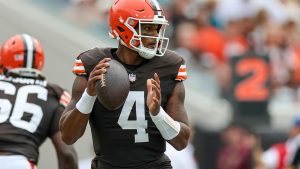
The NFL recently fined Baltimore Ravens linebacker Roquan Smith $16,391 for executing a “hip-drop” tackle on Tampa Bay Buccaneers wide receiver Chris Godwin. The controversial tackle caused a season-ending injury for Godwin, who had been a key part of Tampa Bay’s offense. Smith’s penalty has reignited the debate over “hip-drop” tackles and their safety within the NFL, especially as player safety continues to be a primary focus for the league. NFL officials have been increasingly monitoring this tackling style, which has been cited for causing serious injuries due to its mechanism—where a defender uses their body weight to pull a player down by dropping their own hips, often leading to lower body or knee injuries.
“Hip-drop” tackles are a growing point of concern due to their potential for causing severe damage. In recent years, they have injured multiple high-profile players, sparking discussions on whether they should be penalized, regulated, or even banned. The NFL’s rulebook does not currently prohibit this specific technique, but Smith’s fine underscores how the league may address potentially dangerous forms of tackles in the future. Injuries like Godwin’s amplify the need for rule modifications that could help reduce the likelihood of players getting sidelined for extended periods.
This recent fine has also spurred debate among players, analysts, and fans. Many argue that defenders are often put in difficult positions, where they have limited control over how tackles unfold, especially in fast-paced plays. Some defenders have expressed frustration with the NFL’s stance on tackling regulations, believing that too many rules can hinder their ability to play effectively. Supporters of stricter regulations, however, emphasize the importance of evolving safety standards to protect athletes from avoidable injuries and prolong their careers.
While the NFL has made numerous changes over recent years to promote safer gameplay—such as helmet-to-helmet restrictions and protecting quarterbacks more rigorously—tackling techniques like the hip-drop remain ambiguous in terms of policy. As the league considers additional safety measures, some anticipate the potential for new guidelines or even penalties for “hip-drop” tackles, similar to those for horse-collar tackles introduced after they were found to frequently lead to injuries.
For now, Smith’s fine stands as a reminder of the league’s increasingly proactive approach toward player safety, even as it prompts further examination of how defensive plays impact athletes’ health. This evolving focus may shape the future of NFL defense strategies, tackling techniques, and broader gameplay, reflecting the NFL’s commitment to safeguarding players’ well-being on the field.







